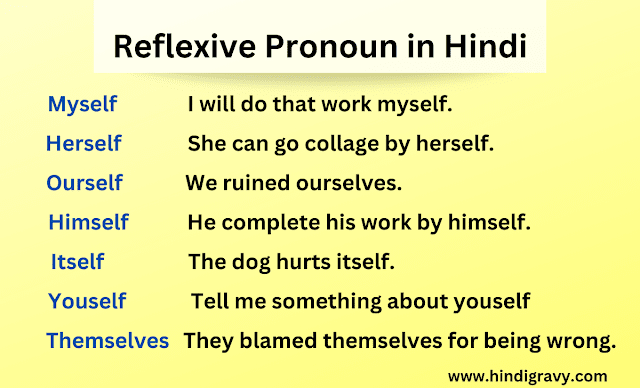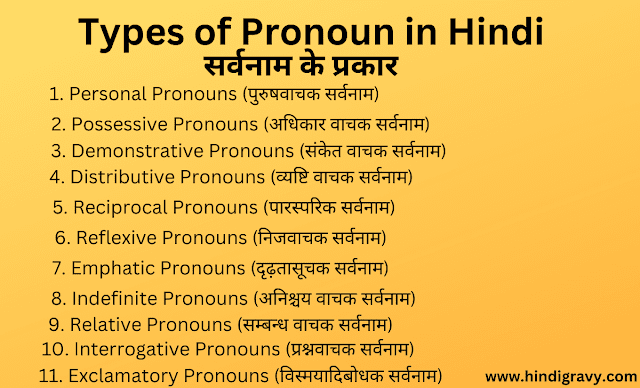वे Pronoun जिनके last में self or selves जुड़े रहते हैं Reflexive Pronouns कहलाते हैं। इसका प्रयोग 'अपने आपको' के अर्थ में होता है। इसे self pronouns भी कहा जाता है।
Reflexive Pronoun Definition in Hindi
Reflexive Pronoun की परिभाषा :- जिस सर्वनाम का प्रयोग व्यक्ति या वस्तु स्वयं के लिए करता है उन्हें निजवाचक सर्वनाम कहते हैंनिजवाचक सर्वनाम के अन्तर्गत आपने आप, स्वयं, खुद आदि शब्द आते हैं।
जैसे - Myself, ourselves, yourself, yourselves, himself, herself, itself, themselves, इसे Emphasizing pronouns भी कहा जाता है।
Reflexive Pronoun Meaning in Hindi
Reflexive Pronoun को हिन्दी में 'निजवाचक सर्वनाम' कहा जाता है। Reflexive Pronoun का अर्थ 'अपने आपको' (स्वयं) के प्रयोग में होता है।
Read also :
Present Indefinite Tense in Hindi
Reflexive Pronoun Definition
Reflexive Pronoun Definition :- A Reflexive Pronoun is a pronoun used as an object that refers to the same person or things as the subject.
Example :
(i) I complete work by myself.
(ii) Everyone hurts himself.
(iii) I ate dinner by myself.
(iv) Alia painted a picture of herself.
(v) They hurt themselves.
Table of Reflexive Pronoun
|
Nominative |
Reflexive Pronouns |
|
I |
Myself |
|
We |
Ourselves |
|
You |
Yourself (singular) Yourselves (Plural) |
|
He |
Himself |
|
She |
Herself |
|
It |
Itself |
|
They |
Themselves |
Note : (i) Possessive Adjective + own का प्रयोग भी subject को emphasis करने के लिए किया जाता है।
जैसे - (i) I live my won income.
(ii) Virtue has its own reward.
(iii) She lifted her own box.
(iv) They love their won word.
Types of Pronoun in Hindi
1. Personal Pronouns - (पुरुषवाचक सर्वनाम)
2. Possessive Pronouns - (अधिकार वाचक सर्वनाम)
3. Demonstrative Pronouns - (संकेत वाचक सर्वनाम)
4. Distributive Pronouns - (व्यष्टि वाचक सर्वनाम)
5. Reciprocal Pronouns - (पारस्परिक सर्वनाम)
6. Reflexive Pronouns - (निज वाचक सर्वनाम)
7. Emphatic Pronouns - (दृढ़तासूचक सर्वनाम)
8. Indefinite Pronouns - (अनिश्चय वाचक सर्वनाम)
9. Relative Pronouns - (सम्बन्ध वाचक सर्वनाम)
10. Interrogative Pronouns - (प्रश्नवाचक सर्वनाम)
11. Exclamatory Pronouns - (विस्मयादिबोधक सर्वनाम)
Reflexive Pronoun का प्रयोग
1. Feminine words - Sita, Radha, Nilu, Alka, The girls, Mother, Sister,.....etc. के लिए herself का प्रयोग है।
2. Masculine words - Ram, Krishna, Mukesh, Sudhir, The Boys, Father, Brother,.....etc के लिए himself प्रयोग होता है।
3. Common Gender के Noun - The doctor, The teacher, The engineer,.....etc के लिए Singular sense में himself तथा Plural sense में themselves का प्रयोग किया जाता है, लेकिन female को इंगित (denote) करने के लिए herself का प्रयोग जाता है।
4. One के लिए Reflexive Pronoun - oneself का प्रयोग होता है।
5. Everyone, Someone, Anyone, No one, Everybody, Somebody, Anybody, Nobody, Common Gender के pronouns (Infinite) हैं। इसके लिए Reflexive Pronoun - himself का प्रयोग है। लेकिन female को इंगित (denote) करने के लिए herself का प्रयोग जाता है।
Note : (1) Child, Infant, baby, के male या female sex का पता नहीं होता हो, तो इसके लिए Reflexive Pronoun - itself, neuter pronoun - it तथा Possessive Adjective - its का प्रयोग होता है।
जैसे -
(i) The baby cried itself. (✔)
(ii) It was beautiful. (✔)
(iii) The baby has broken its leg. (✔)
(2) यदि किसी sentence के verb का subject तथा object व्यक्ति या वस्तु (the same person or thing) हो तो verb के object के रूप में Reflexive Pronoun का प्रयोग होता है ;
जैसे -
1. I hurt myself. (✔)
2. I hurt mineself. (✖)
3. We hurt ourselves. (✔)
4. We hurt ourself. (✖)
5. You hurt yourself. (Singular) (✔)
6. You hurt yoursself. (✖)
7. You hurt yourselves. (✔)
8. Your hurt yoursselves. (✖)
9. He hurts himself. (✔)
10. He hurts himselves. (✖)
11. She hurts herself. (✔)
12. She hurts herself. (✖)
13. The dog hurts itself. (✔)
14. The dog hurts itselves. (✖)
15. The dog hurts himselves. (✖)
ऊपर दिए गए examples में verb के object रूप में Reflexive Pronoun का प्रयोग हुआ है। Verb के object के रूप में Reflexive Pronoun का प्रयोग तब होता है, जब verb का subject और object एक ही व्यक्ति या वस्तु हो।
Rule (2) यदि किसी sentence के verb का subject तथा object दो भिन्न व्यक्ति हो, तो Reflexive Pronouns का प्रयोग नहीं होता है, बल्कि Objective Case के pronoun का प्रयोग होता है।
जैसे -
He knows me (✔) → He knows myself. (✖)
I love you (✔) → I love yourself. (✖)
Rule 3. Enjoy, pride, absent, present, introduce, busy, avail, address, plume, hurt, cheat, prostrate, resign, apply, acquit, assert - Verbs के बाद Reflexive Pronouns का प्रयोग निश्चित रूप से होता है।
जैसे -
(i) He enjoyed himself in the party. (✔)
(ii) He enjoyed in the party. (✖)
(iii) Mr. Pathak prides himself on the result of his son. (✔)
(iv) Mr. Pathak prides on the result of his son. (✖)
Note : (1) लेकिन open, sell, wash, dress, undress, shave, concentrate, feel, hurry, - Verbs के बाद Reflexive Pronouns का प्रयोग नहीं होता है।
जैसे -
(i) The door open itself. (✖)
(ii) The door opened. (✔)
(iii) He shaved himself on Sunday. (✖)
(iv) He shaves on Sunday. (✔)
(2) कभी-कभी subject को emphasis करने के लिए dress, shave,.....etc. के बाद Reflexive pronoun का प्रयोग होता है।
(i) Aditi is old enough to dress herself now.
(ii) The barber shaves all the people in the town who don't shave themselves.
Rule 4. Reflexive pronoun का प्रयोग sentence के subject के रूप में नहीं होता है। जैसे -
Myself is Mr. Aditya verma. (✖)
I am Mr Aditya verma. (✔)
Binay and yourself are friends. (✖)
Binay and you are friends. (✔)
Rule 5. Reflexive pronoun के साथ Apostrophe 's' ('s) का प्रयोग नहीं होता है, लेकिन Possessive Adjective + own का प्रयोग होता है। जैसे -
He sold himself's car. (✖)
He sold his own car. (✔)
I have painted myself's room. (✖)
I have painted my own room. (✔)
Rule 6. यदि किसी sentence में Verb + Preposition का प्रयोग हो, तथा verb का subject और preposition का object same person / thing (एक ही वस्तु /व्यक्ति) हो, तो preposition के बाद Reflexive pronoun का प्रयोग होता है, न कि objective case के pronoun का। जैसे -
My mother must look after herself. (✔)
verb prep. Ref. pron.
My mother must look after her. (✖)
verb Prep. objective case
The saint often talks to himself. (✔)
The saint often talks to him. (✖)
Note : लेकिन Verb का subject तथा preposition का object two different person / things हो, तो preposition के बाद objective case के pronoun का प्रयोग होता है, न कि Reflexive pronoun का।
जैसे -
The principal distributed the books among themselves. (✖)
The principal distributed the books among them. (✔)
Gudiya depends on yourself and myself. (✖)
Gudiya depends on you and me. (✔)
ध्यान दें : Verb का subject तथा preposition का object same persons/thing हो तथा preposition से स्थान (place) का बोध हो, तो preposition के बाद Reflexive pronoun का प्रयोग नहीं होता है, बल्कि objective case के Pronoun का प्रयोग होता है। जैसे -
We put the baby between ourselves. (✖)
Prep. Ref. Pron.
We put the baby between us (✔)
Prep. objective case
Rule 7. Reflexive Pronoun का प्रयोग keep, conceal, qualify, spread, rest, stay - Verbs के बाद नहीं होता है। जैसे -
I stayed myself away from my class. (✖)
I stayed away from my class. (✔)
He qualified himself in the test. (✖)
He qualified in the test. (✔)
She kept herself away from the show. (✖)
She kept away from the show. (✔)
Reflexive Pronoun Exercise
Correct the following sentences :
1. I will do it me.
2. The boys self has spoiled his life.
3. We our self saw it.
4. The walls itself fell.
5. We Congratulated themselves on our escape.
6. They quarrelled among ourselves.
7. He satisfied myself that he had posted the letter.
8. It was told so by the teacher myself.
9. We will see it ourselves.
10. They their self admitted their guilt.
11. He absents from the school everyday.
12. He prides on his style.
13. He often speaks to him.
14. He depends on yourself and myself.
15. Himself will help you.
Answer
1. I will do it myself.
2. The boy himself has spoiled his life.
3. We ourselves saw it.
4. The walls themselves fell.
5. We Congratulated ourselves on our escape.
6. They quarrelled among themselves.
7. He satisfied himself that he had posted the letter.
8. I was told so by the teacher himself.
9. We will see it ourselves.
10. They themselves admitted their guilt.
11. He absents himself from the school everyday.
12. He prides himself on his style.
13. He often speaks to himself.
14. He depends on you and me.
15. He will help you.
Related Post :
Demonstrative Pronoun in Hindi
Present Continuous Tense in Hindi
Present Perfect Tense in Hindi
Infinitive and Gerund in Hindi








0 टिप्पणियाँ